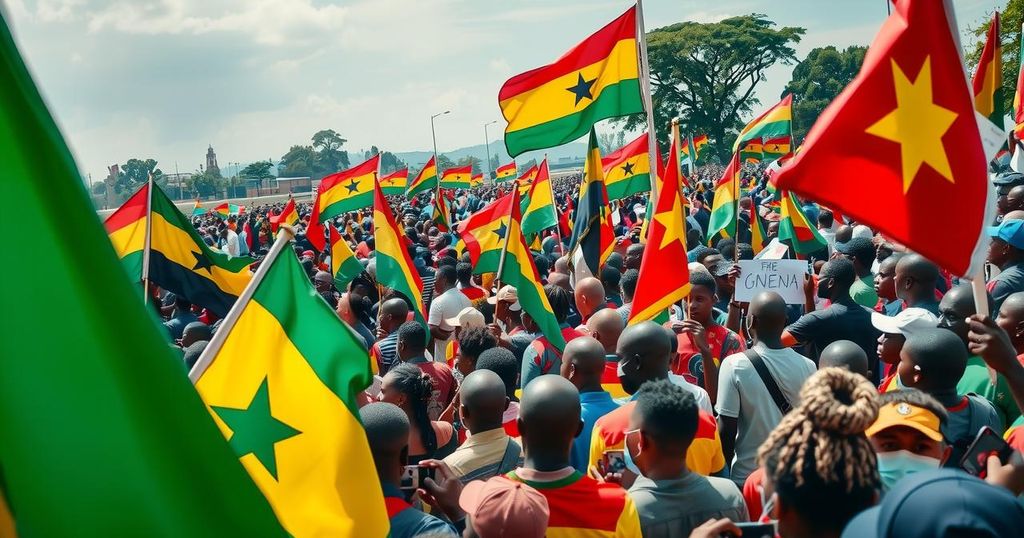In Ghana’s upcoming elections, candidates have pledged to intensify anti-LGBTQ+ measures, promising to enact a controversial bill that could imprison those identifying as LGBTQ+. Scheduled for Supreme Court review, the bill increases penalties and expands definitions of illegal activities related to sexual and gender minorities, reflecting a pervasive anti-LGBTQ+ sentiment in society.
Ahead of Ghana’s general elections next month, the LGBTQ+ community faces severe challenges as both leading presidential candidates have committed to intensifying measures against gay rights. The winner of the December 7 elections may be required to enact or reject a controversial bill passed by parliament, which mandates imprisonment for individuals identifying as LGBTQ+. Scheduled for a Supreme Court review on December 18, the bill’s scope broadens existing laws, escalating penalties against sexual and gender minorities. The ruling party’s Mahamudu Bawumia has pledged to sign the bill, while his rival, John Dramani Mahama, endorses strengthening laws against LGBTQ+ activities.
This proposed legislation not only expands the definition of illegal actions but also punishes family and friends failing to report LGBTQ+ individuals. Abena, an LGBTQ+ advocate, expresses deep concerns, stating, “These are people who are actually supposed to protect me. My vote and the rest of the community’s will put them in a position of leadership. I feel like I do not belong.” In a country where gay sex is already criminalized, the proposed bill, if enacted, is expected to exacerbate violence and discrimination.
The anti-LGBTQ+ sentiment has been exacerbated by ongoing debates surrounding the bill, significantly increasing hostility towards the community. A 2021 Afrobarometer survey revealed that only 7% of Ghanaians expressed tolerance for same-sex relationships, reflecting a predominantly homophobic public attitude. Religious organizations have mobilized against LGBTQ+ rights, viewing same-sex acts as contradictory to Ghanaian values and traditions.
Human rights activists caution that the increased hostility could lead to heightened attacks on LGBTQ+ individuals, further isolating them within society. Efforts to protect LGBTQ+ rights have been met with resistance, as indicated by the worrying trend toward criminalizing supportive actions. Hans Burinyuy, an advocate, notes that the proposed bill could restrict professional opportunities for individuals associated with LGBTQ+ advocacy further.
On an international level, the European Union has condemned the proposed legislation, labeling it “profoundly disturbing” for violating Ghana’s constitutional obligations and international human rights commitments. Concerns over lost donor funding related to the enforcement of such a bill have also been communicated to the Ghanaian populace.
As the Supreme Court considers legal challenges surrounding the bill, individuals like Abena stress that the impending decision may not arrive in time for their voting decisions. She remarks, “I feel the country isn’t safe for people like me if the first, second, and third options are all using the LGBT bill to score more points,” highlighting the urgency and gravity of the situation facing LGBTQ+ individuals in Ghana.
The situation regarding LGBTQ+ rights in Ghana has become increasingly dire as the country heads into general elections. The leading candidates, motivated by strong public sentiment against LGBTQ+ rights, have vowed to revisit existing anti-LGBTQ+ legislation. With the proposed bill set to impose severe implications for the community, the stakes are high as advocates and legal experts await crucial court rulings that could significantly impact the lives of sexual and gender minorities. Ghana’s complex social fabric, influenced by religious norms and cultural beliefs, creates a challenging environment for the LGBTQ+ community, often leading to marginalization and violence against them.
As Ghana approaches its elections, the anti-LGBTQ+ climate raises significant concerns regarding the safety and rights of its LGBTQ+ population. With prospective leaders fueling existing prejudices and committing to legislative measures that could further criminalize LGBTQ+ identities, the upcoming judicial decisions and election outcomes are pivotal. Advocates warn that failure to protect the rights of these individuals could escalate discrimination and violence, urging a reevaluation of values in a rapidly changing global narrative concerning human rights and inclusivity.
Original Source: www.voanews.com






